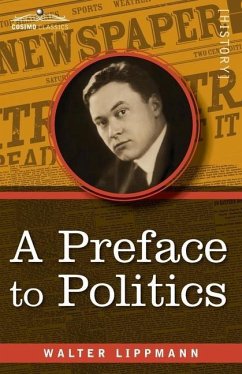"When men and women begin to feel that elections and legislatures do not matter very much, ...., the reformer might as well put to himself a few searching doubts.." --Walter Lippmann, from the Introduction A Preface to Politics (1913) was the first book published by Walter Lippmann, one of the most influential journalists of the 20th century. This book of essays, written by 23-year-old Lippmann, is about the fundamental importance and purpose of politics. Although written more than a hundred years ago, many of Lippmann's observations are surprisingly valid for today's politics, such as that successful politicians understand and champion the concerns of the regular voter. Politics is more about emotions than logical reasoning. Government needs statesmen, rather than mechanical "routineers," which often rise to the political top. Due to Lippmann's early interest in socialism, this book is mildly socialistic. However, Lippmann was also critical of socialism and later moved completely away from this ideology. A Preface to Politics is a timeless classic and must-read for journalists, politicians, and all who are interested in American history and its lessons for today.
Hinweis: Dieser Artikel kann nur an eine deutsche Lieferadresse ausgeliefert werden.
Hinweis: Dieser Artikel kann nur an eine deutsche Lieferadresse ausgeliefert werden.








